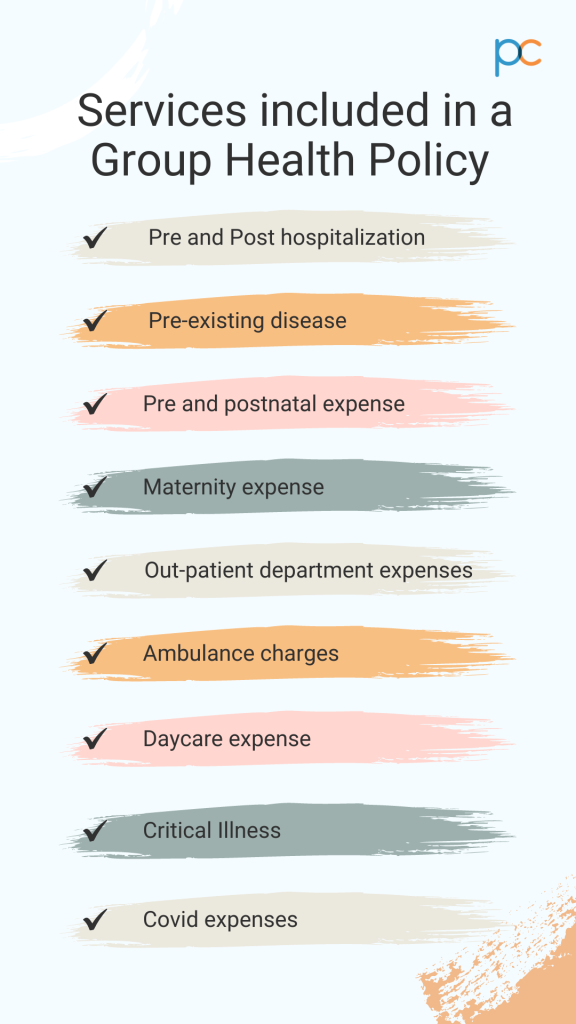
Table of Contents
Group Health Insurance
A group health insurance indemnifies the health care needs of the employees, as per the coverage opted.
Organizations prefer buying group health insurance policies as it ensures all of their employees under a single cover. Also, the cost of the premium for an individual health insurance policyThe legal document issued to the policyholder that outlines the conditions and terms of the insurance; also called the ‘policy More will be more expensive as compared to a group health insurance policyThe legal document issued to the policyholder that outlines the conditions and terms of the insurance; also called the ‘policy More.
The coverage provided under the group health insurance policyThe legal document issued to the policyholder that outlines the conditions and terms of the insurance; also called the ‘policy More is extended to the employees till their work tenure. Once they leave the organization, their health insurance policyThe legal document issued to the policyholder that outlines the conditions and terms of the insurance; also called the ‘policy More collapses, with that particular organization. However, as long as they stick to any organization, they can enjoy the health benefits offered to them and their family. The policyThe legal document issued to the policyholder that outlines the conditions and terms of the insurance; also called the ‘policy More generally covers the insured from age 91 days to 80 years.
The benefits offered by an organization’s group insuranceGroup Insurance refers to any insurance plan under which a group of employees (and their dependents), or members of a More policyThe legal document issued to the policyholder that outlines the conditions and terms of the insurance; also called the ‘policy More depends on the type of plan it opts for and the benefits it wants to cover for its employees. Numerous expenses such as hospitalization charges, maternity benefit, consultation fees of the doctor, lab tests etc are covered under any health insurance policyThe legal document issued to the policyholder that outlines the conditions and terms of the insurance; also called the ‘policy More.
Majorly, a decent group health insurance policy included below mentioned services.
- Pre and Post hospitalization
- Pre-existing disease
- Pre and post natal expense
- Maternity expense
- Out-patient department expenses
- Ambulance charges
- Daycare expense
- Critical Illness etc
- Covid expenses
Pre and Post Hospitalization expense: Pre hospitalization expense is referred to as the medical fee incurred by the insured before getting admitted to the hospital. And Post hospitalization expense is referred to as the medical expenses incurred by the insured after getting discharged from the hospital. Expenses incurred up to 30-60 days are covered under pre and post-hospitalization.
Pre-hospitalisation Expenses
These expenses include the cost incurred on various types of tests before getting admitted to the hospital. To accurately diagnose the medical condition of any patient, doctors generally run the patient through various medical tests. The number and kind of medical tests depend on the health and medical condition of the patient.
These medical tests such as blood tests, urine tests, total blood count, X-rays etc are covered under the pre-hospitalisation expense. It also includes the consultation fees of the doctor.
However, there is a limit to the number of days before which the insured is getting admitted to the hospital. Generally, medical charges borne within or before 30 days before admission in the hospital are covered under pre-hospitalization expenses. Still, it may differ depending on the plan of the health insurance provider.
Pre Hospitalisation: Medical expenses incurred immediately before the Insured person is hospitalised, provided that :
- Such medical expenses are incurred for the same condition for which the Insured Person’s Hospitalisation was required, and
- The Inpatient Hospitalisation claim for such Hospitalisation is admissible by the Insurance Company.
Post Hospitalization Expenses
These expenses include the expense incurred after getting discharged from the hospital. To accurately confirm that the patient has recovered from the diagnosed illness, various tests could be conducted by the doctor post-hospitalization. These tests are included in post-hospitalization expenses. Generally, charges incurred by the insured from 60 days of the discharge date are included in post-hospitalization expenses. Expenses related to Naturopathy and acupuncture are not provided by the insurance providers.
Employees can claim pre and post hospitalization expenses by submitting the original bills receipt and a copy of the doctor’s prescription or certificate to the employer.
Post Hospitalisation: Medical expenses incurred immediately after the Insured person is discharged from the hospital, provided that :
- Such medical expenses are incurred for the same condition for which the Insured Person’s Hospitalisation was required, and
- The Inpatient Hospitalisation claim for such Hospitalisation is admissible by the Insurance Company.

Pre-existing Disease
The pre-existing disease is referred to as disclosure of any existing medical condition to the insurance company as well as the employer at the time of policyThe legal document issued to the policyholder that outlines the conditions and terms of the insurance; also called the ‘policy More purchase. Although insurance companies do not prefer to include any pre-existing disease under their coverage. However, with a group insuranceGroup Insurance refers to any insurance plan under which a group of employees (and their dependents), or members of a More policyThe legal document issued to the policyholder that outlines the conditions and terms of the insurance; also called the ‘policy More, it can be covered with the time clause.
Under group health insurance, the insurance companies insure any employee with a pre-existing disease by adding a waiting periodThe period of time that an individual must wait either to become eligible for insurance coverage or to become eligible More. They offer a time duration in which the employee with an existing medical condition will not be able to raise any claim. Once the waiting periodThe period of time that an individual must wait either to become eligible for insurance coverage or to become eligible More is over, the employee can begin to claim the expenses of pre-existing disease under the insurance cover. Some insurance companies may choose to keep a waiting periodThe period of time that an individual must wait either to become eligible for insurance coverage or to become eligible More of 2 years, some may choose 3. It depends on their discretion.
In case the insured hides the pre-existing disease at the time of policyThe legal document issued to the policyholder that outlines the conditions and terms of the insurance; also called the ‘policy More purchase, the insurance company can reject the claim of the insured.
Pre and post Natal Expense
Under group health insurance, all pregnancy-related expenses are covered by the employer. Pregnancy care consists of prenatal ( before birth) and postnatal ( after birth) care.
Prenatal Expenses
During the entire journey of nine months, the expectant mother has to undergo numerous tests such as blood tests, urine tests, CBC, frequent checkups to her doctor and different ultrasound scans to ensure the baby’s health, till the final delivery. These expenses are incurred each month and are included in prenatal expenses.
Postnatal Expense
These expenses are related to the post-delivery of the baby. They can be vaccination charges, medications and consultation fees of the doctor. After the baby is delivered, the mother needs supplements and regular check-ups to ensure proper recovery.
Maternity Expense
Maternity expense refers to the coverage provided to the employees for hospitalization and delivery of the baby, till the time of the discharge. It includes complicated surgeries including normal and cesarean section deliveries.
In case of the premature birth of the baby, the expenses incurred in NICU are borne by the employer under group health insurance.
However, the benefits and coverage may differ as per the health insurance plan chosen by the employer.
Preservation of stem cells facility is not covered by the employer or the insurance companies.
Out Patient Department Expenses(OPD)
These expenses are claimed on a regular basis by an employee as it does not need any hospitalization. These are minor expenses incurred on the day to day life of any employee such as minor illness or sudden injury. The expenses include dental treatment, spectacles, eye treatment, lab tests, consultation fees of the doctor, beautification treatments etc.
Some health insurance covers more than regular medical expenses such as implants, beautification treatments, expenses at body rejuvenation centres etc. However, the inclusion of such benefits under the insurance plan is at the discretion of the employer.
Ambulance Charges
In case of any life-threatening injury or sudden critical situation, financial protection is provided under the ambulances services and transport. The expense of getting ambulance services can be borne by the insured at the time of emergency. Later the same can be claimed and settled through the employer. Although with various insurance plans there is a cap of a certain amount that differs as per the plan selected.
Daycare Expense
Daycare expenses are the expenses incurred for the treatment that requires the hospitalization of the insured for below or 24 hours. Under daycare expenses the tests conducted and the surgeries performed with the requirement of hospitalization for less than a day is covered. For example radiation therapy, cataract operation etc.
Critical Illness Expense
Critical illness is referred to as an ailment that is sudden and life-threatening and can impact the organs of the body. The treatments for these ailments are generally expensive because of their nature. With group health insurance, employees are secured with critical illness expenses. The insurance companies provide a list of critical illnesses that are included under the insurance plan. However, any organization can restrict the count based on its own preference.
Below mentioned are some examples of critical illnesses.
- Heart attack
- Stroke
- Cancer
- Kidney failure
- Lungs failure
- Bypass surgery
- Brain surgery
- Heart Valve surgery
- Parkinson’s disease
- Loss of limbs
- Permanent paralysis of limbs
- Brain Tumor
- Radiotherapy
- Dialysis etc
Covid Expense
Novel Coronavirus (COVID-19) is a virus that attacks the immunity of a person leading to several diseases. It includes infections ranging from fever, throat, upper nose, chest congestion, multiple organ failure to severe acute respiratory syndrome( SARS). It proved to be largely fatal for people above the age of 60 or people with pre-existing medical conditions.
Since the outbreak of the pandemic, insurance companies and organizations began to include the covid care expenses in their base plan. The intent is solely to secure the health of its employees. The covid care expense includes the expense incurred on pre and post hospitalization, medicine and consultation fees.
Advantages of Group Insurance Policy
- Customized healthcare for employees as per their need
- No restriction on age
- No physical health check-up required
- Increase the morale of an employee
- Provide more benefits than individual health policyThe legal document issued to the policyholder that outlines the conditions and terms of the insurance; also called the ‘policy More
- Covers the entire family under the given sum insured
- Covers pre-existing diseases
Every organization is different from another one and so is its philosophy. Respecting this belief, group health insurance policies are customized and created individually by the insurance companies, aiming to provide maximum benefit with an affordable premium for employers.
